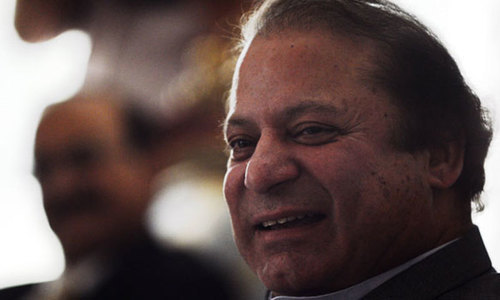ISLAMABAD: After his disqualification on Friday, July 28, former prime minister Nawaz Sharif is not in a position to appeal his dismissal due to the ‘negligence’ of his own aides.
The former prime minister’s team, out of fear of criticism, did not try and push through an amendment which would have given Mr Sharif a chance to appeal his disqualification and ask for a different and larger bench.
At present, there is no provision of an appeal against a decision of the Supreme Court; only a review petition can be filed in front of the same bench and this is rather limited in its scope.
The SC on July 28, on petitions filed by the rival politicians, disqualified Mr Sharif under Section 99(f) of Representative of Peoples Act (Ropa) and Article 62(1)(f) of the Constitution.
The case against the three-time former prime minister was based on petitions filed by Pakistan Tehrik-i-Insaf (PTI) chairman Imran Khan, Jamaat-i-Islami emir Sirajul Haq and local politician Sheikh Rashid Ahmed.
These petitions were filed under the Article 184(3) of the Constitution, which empowers the apex court to pass any order to enforce fundamental rights.
Under Article 184(3), the Supreme Court entertains petitions and passes an order which cannot be challenged before any appellate forum or bench. However, there is a limited remedy – a review petition that is heard by the same bench that had passed the earlier order.
However, a bill to amend this limited power of review under Article 184(3) and suo motu cases has been pending with the legislature.
The proposed 24th constitutional amendment bill was introduced by PPP lawmaker Ayaz Soomro as a private member’s bill, aimed at amending the Law Reforms (Amendment) Act 2015.
24th amendment bill to allow appeals against suo motu verdicts couldn’t be passed in time to save Mr Sharif
It proposed amendments to sections 3 and 4 of the Law Reforms Ordinance 1972, allowing for an appeal against a suo motu verdict; this appeal is to be heard by a larger bench of the Supreme Court against any order or judgement than the bench that gave the order.
This bill, which was introduced in March 2015, was opposed by the government on the grounds that it needed to be tabled as a constitutional amendment.
In November last year, Law Minister Zahid Hamid tabled the bill as a constitutional amendment in which, in addition to suo motu cases, the right of appeal was proposed against decisions passed in cases heard under Article 184(3) of the Constitution.
The National Assembly speaker referred this bill to the Standing Committee on Law and Justice, which cleared it in March this year and referred it back to the lower house for voting.
Under the proposed law, appeals challenging such judgements can be filed within two months of the date of the order.
If approved, it would take effect from the date of the commencement of the 18th Amendment in 2010 – a period when a number of suo motu notices were taken up by former chief justice Iftikhar Mohammad Chaudhry.
Constitutional expert S.M. Zafar, who was one of the members of the constitutional reforms committee that drafted the 18th Amendment in 2010, said the body wanted to amend Article 184(3). “However, a majority of the members feared that if we touched the issue, then-chief justice Chaudhry would have scrapped the entire exercise.”
He added that the constitutional reforms committee preferred to leave the issue for a later stage.
“The committee also considered omitting Article 62 and 63 of the Constitution, but the PMLN was reluctant to touch those articles,” he added.
A report of the Law and Justice committee of the National Assembly on the amendment seeking right of appeal against Article 184(3) proceedings, tabled before the lower house in March this year, says: “At present there is no provision for appeal against an order of the Supreme Court in exercise of its original jurisdiction under clause 3 of Article 184 of the Constitution.”
It further says: “Since such an order invokes a question of public importance with reference to enforcement of fundamental rights… an aggrieved party should have the right of appeal, which shall also be in conformity with the fundamental right to fair trial and due process conferred by Article 10-A of the Constitution.”
“The proposed amendment provides for an appeal within thirty days of an order of the Supreme Court… to be heard by a bench larger than the bench which had passed the order under appeal.”
According to retired PML-N’s Justice Iftikhar Cheema, a member of the National Assembly standing committee on Law and Justice, “this matter was mishandled”.
“I repeatedly called for the early approval of this amendment but it is unfortunate that no one heeded my advice. Had this amendment passed on time, Mr Sharif could have filed an appeal against his disqualification,” he said.
It may be mentioned that Justice Cheema was accused of concealing the assets of his spouse. He opted to resign while the proceedings against him were continuing and returned to the assembly after winning a by-election.
Chairman standing committee on law and justice Mr Virk said that his committee had submitted the report to the National Assembly on time. He said that it was the responsibility of the ministry concerned to pursue the matter.
When contacted Barrister Zaffarullah Khan, then special assistant to the PM said that “we did not press (for this amendment) because we did not want the opposition to link it to the Panama case and accuse us of passing a law to save our own skin.”
Published in Dawn, August 2nd, 2017


















































